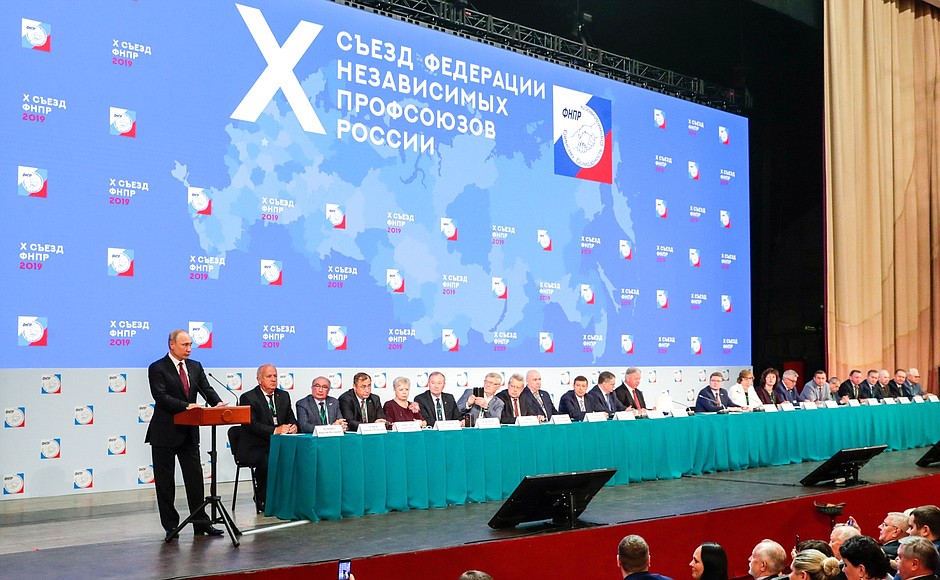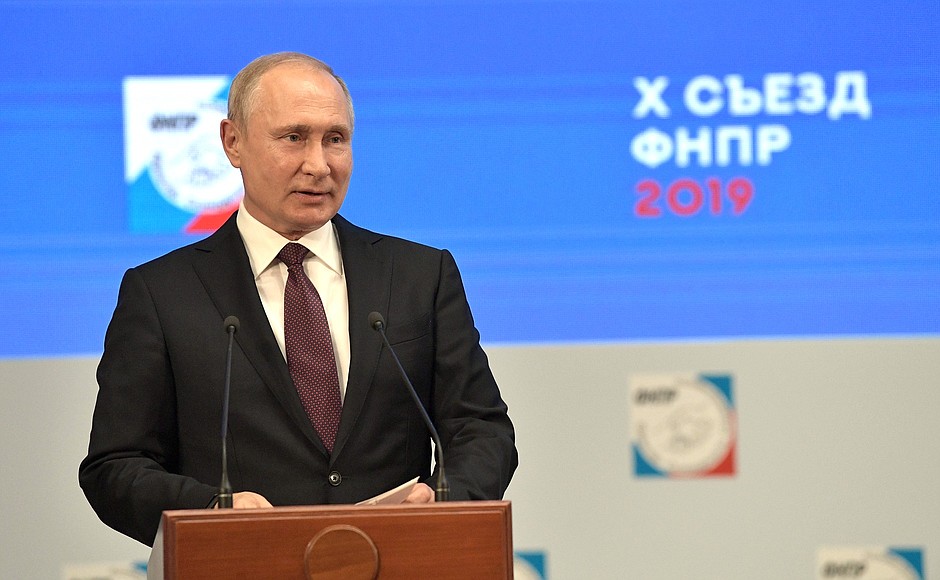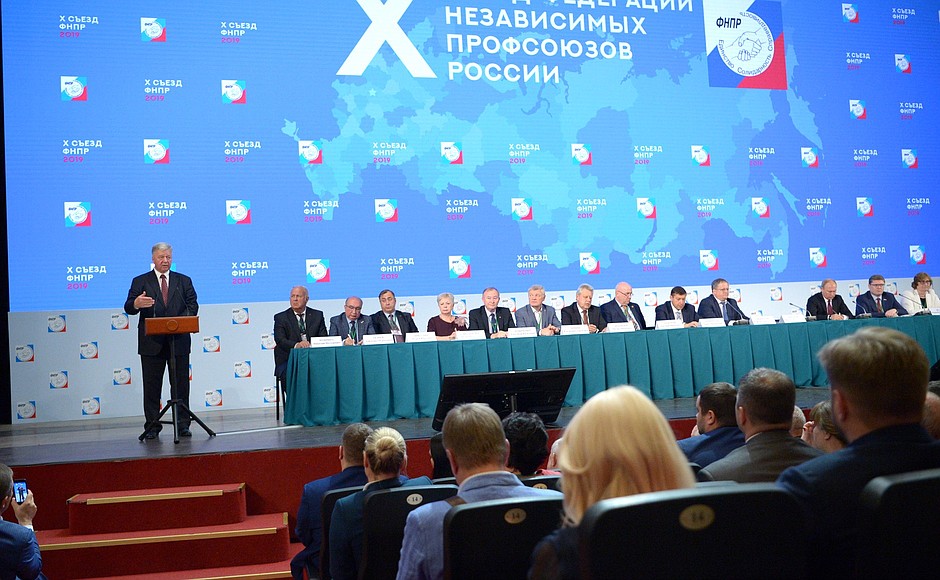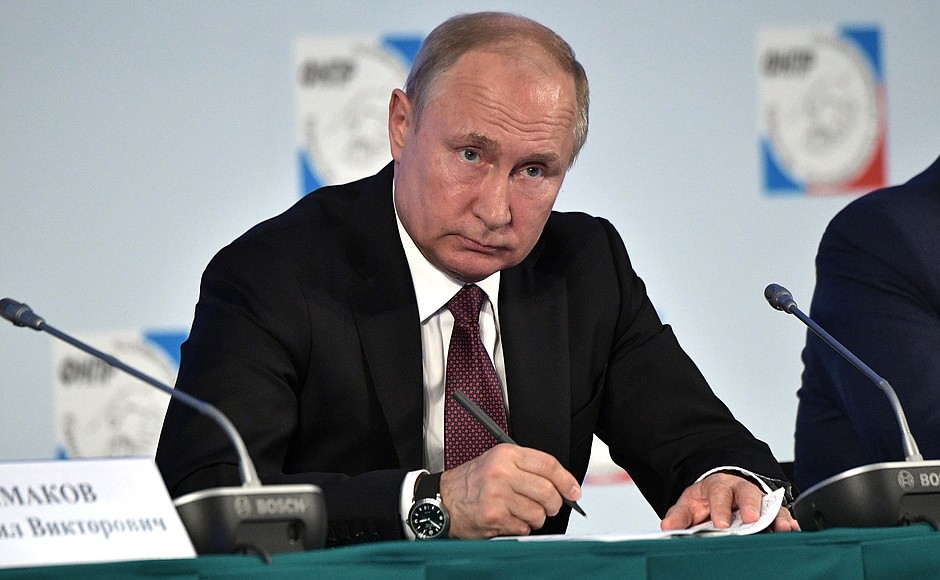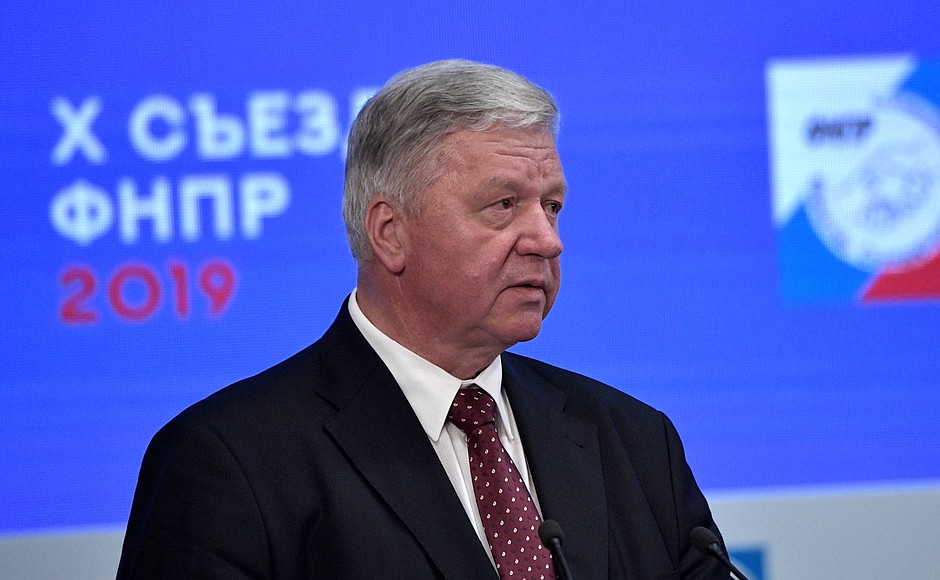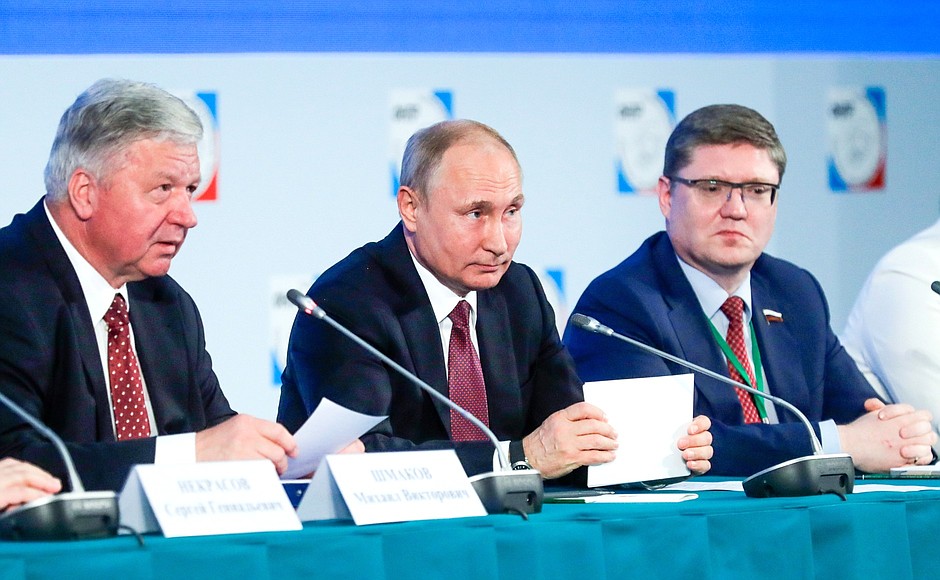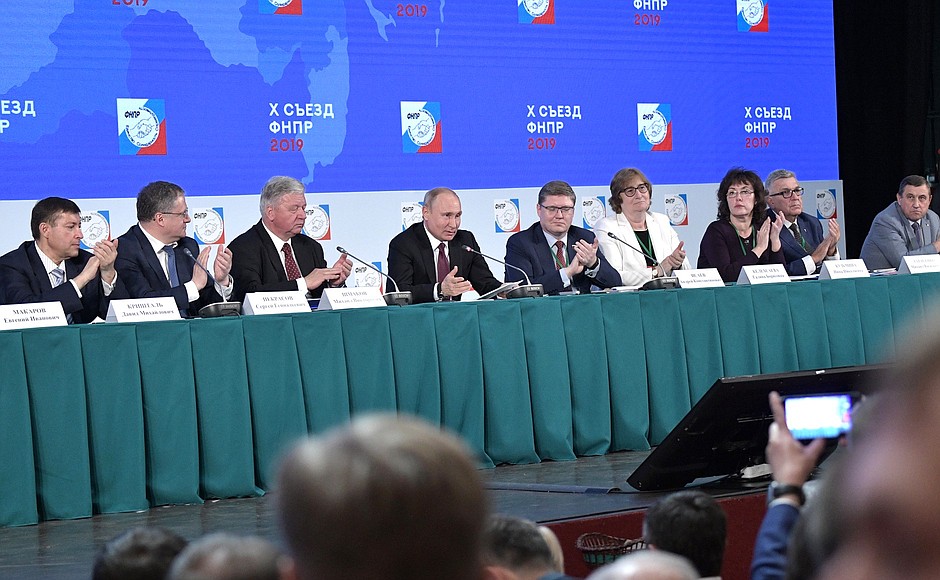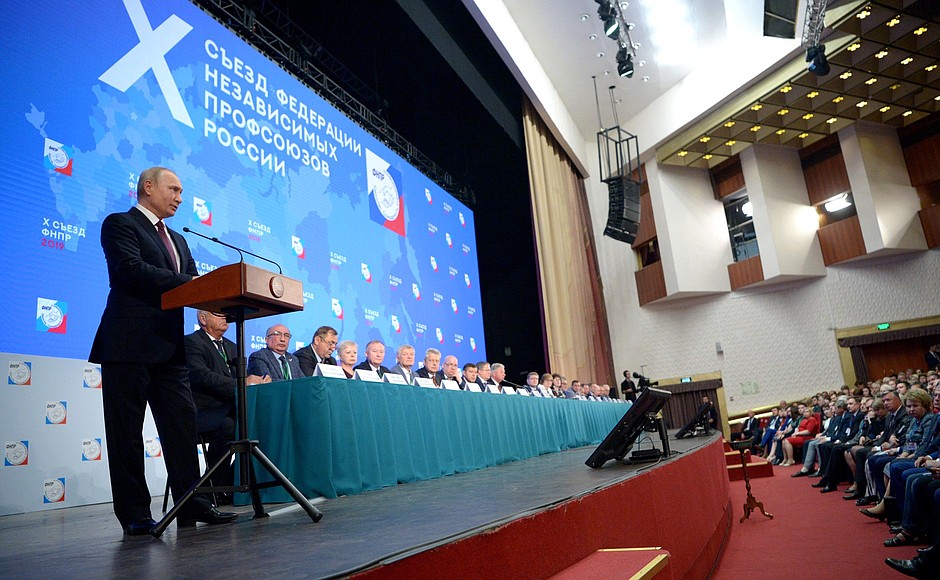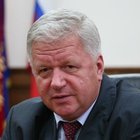The forum is attended by over 650 delegates from trade union organisations, government officials, representatives from employer associations, political parties, scientific and cultural world, from foreign trade unions and international associations on defending the rights of workers, as well as trade union veterans.
The participants discussed the results of the performance of the Federation of Independent Trade Unions from February 2015 to May 2019, as well as imminent tasks and an action plan for the future.
* * *
President of Russia Vladimir Putin: Colleagues, friends.
This is not the first time that we are meeting together and it is always a pleasure to speak with representatives of Russia’s biggest trade union associations, all the more so as this year it is the 100th anniversary of the International Labour Organisation.
I would like to point out that its values and concepts concerning decent work and increasing job opportunities for each person and social partnership are being consistently carried out in this country and to a large extent precisely on the basis of the continuous productive cooperation with the trade unions – with you, the Russian trade unions that are one of the most influential forces of our civil society.
The trade unions play a special role. You are endowed by law with huge powers for protecting the working rights of citizens and your valuable and without any exaggeration largely unique experience of reliable partnership with the state in this field is impossible to overrate. Wherever trade unions are proactive, responsible and effective, productive systems of communications are being established between work collectives and employers and issues linked with higher wages, the improvement of working conditions and time off are being promptly resolved.
It is clear that regulating the labour market is never smooth, simple, or easy. Often the interests of the employers and the trade unions defending the interests of wage workers radically diverge.
There are transformations now underway in the economy, at industrial companies, you are well aware of this, and their goal is to eventually achieve better working conditions and higher wages combined. It is important for both trade unions and employers to see these prospects and work together to bring them closer rather than make unrealistic claims or artificially mothball the problems.
It can also happen of course that the owners or the administration of enterprises simply refuse to enter into dialogue, consciously distancing themselves from trade unions and even hindering the creation and activities of industry unions –this does happen sometimes. Such arbitrariness − and this is blatant arbitrariness – is certainly unacceptable. It is necessary to prevent such things, if necessary involving the prosecutor's office or supervisory authorities.
I would like to add here that, as a rule, this state of affairs develops in those regions where tripartite commissions operate formally and sluggishly, where the governors neglect cooperation with trade unions, and union leaders – this also happens – they simply adjust to the established order, having, unfortunately, neither authority nor influence in their regions or at the enterprises. As a result, people are left to themselves in dealing with their work-related and social problems.
I have already said and I will emphasise again: the state, at all levels, is obliged to assist the unions in upholding the labour rights of citizens. This isn’t about pressure or interference with business, none at all. The requirements of the Russian labour legislation are absolutely identical for both private and state-owned enterprises. By the way, the International Labour Organisation ranks it as one of the best in the world.
I believe that the trade unions, which are always actively involved in the development of the laws in this field, should also vigorously monitor their implementation, and should competently and professionally defend the interests of wage workers during court hearings.
One of the main fields of our joint work is to improve the mechanisms of social partnership. The most pressing issues are constantly on the agenda of the Russian Trilateral Commission. I know that trade unionists frequently act as initiators in this sphere. They should continue working like this in the future.
Let me repeat: in the near future the situation concerning the economy, the employment structure and the labour markets as a whole will inevitably change. This is a global trend and it will certainly affect us, all the more so since we are dealing with these issues within our projects. The transformation linked with the upgrading of the production and increasing the labour productivity is an ongoing process and it is certainly necessary to make sure that the problems arising in social and labour relations in this context are expediently resolved. This means to foresee these problems, relying on the forecasts of scientists and experts. Therefore, the importance of these negotiations, a search for compromise and mutually acceptable positions will increase.
In this connection I would like to address the Government and the regional governors: it is necessary to step up henceforth the work in the government-employers-trade unions format and use the potential of trilateral commissions at all levels. In a word, we need to develop continuous, sincere and productive dialogue and to do everything required to prevent the encroachment of the labour rights of citizens as well as to always react adequately to all instances of people being treated badly.
Colleagues,
Historically, trade unions are a basic social structure. Your main mission is to protect the working people. To fully meet this purpose today, it is necessary to keep abreast with the times, and to monitor production innovations, the rapid development of advanced technology, the emergence of completely new occupations and the forthcoming inevitable changes in labour relations.
I believe you understand only too well that these changes require modern approaches when it comes to your activities. I consider it extremely important for the trade unions to develop and become stronger using new ideas and introducing these ideas in our everyday lives. The valuable experience of the past should not be lost in this process. Meanwhile, the spirit of collectivism, enthusiasm and cohesion have always been and will certainly remain the distinctive features of the trade unions and our national character, for that matter and will always be much in demand.
You must have discussed all these matters concerning traditions and the prospects for modernisation. I believe special attention was paid to the participation of trade unions in implementing the national projects about which I have already spoken today. Let me repeat that they are focused on people because in the current rapidly developing world when assets, former products and technology as well as natural resources may vanish in no time, people, their talents, education and abilities conversely remain a fundamental value. Therefore, the main goal of the national projects is to improve the living standards of our people, to create quality and accessible education and healthcare as well as to support families and to reduce the poverty level.
By and large, the trade unions are seeking the same goals in their activities. Colleagues, we have common tasks and common goals.
I would like to wish you every success and thank you all very much.
Chairman of the Federation of Independent Trade Unions of Russia Mikhail Shmakov: Mr President, delegates, congress guests.
Not much time is left before the end of the congress, so I would like to once again point out the main social and labour issues of the country that we have talked about these days, focusing on the issues that, without exaggeration, have become acute; we have discussed them already, but in my speech, I would like to bring them up once again.
In the course of the past five years, we have learnt to live and work in an environment of economic sanctions imposed on our country. But in order to resist them successfully, to move forward to solutions of internal social and economic problems, we have to concentrate and together choose to take a series of necessary steps. Since most of them are within the Government’s purview, I would like to remind everyone about them.
We talked about a fair economy. For wages to grow, the economy has to grow. It appears to us that the growth rates targeted by the Government in the long term, about 1.5 percent, will not allow us to make rapid progress. This means that the government must be more active in terms of creating new production facilities and extending affordable loans to the real sector of economy rather than to financial speculators.
National projects are great, but apart from having bureaucratic forms of oversight that prioritise pieces of paper, they must have other indicators that will clearly and explicitly show citizens that these projects have made it possible to increase incomes, create new jobs and improve people’s lives.
We have already said it at the congress that we have to actively participate in carrying out national projects and actively monitor their efficient implementation, since it is us, the citizens of Russia, who primarily benefit from the implementation of these national projects.
I would also like to reiterate that we suggest and insist that the Russian Federal State Statistics Service be free from departmental interference so that we have the most accurate and generally accepted picture of the real state of affairs in every sphere of life.
We continue to advocate for a progressive income tax and raising taxes on dividends as well as zeroing out the income tax rate for the working population’s income at or below minimum wage. Introducing such a tax will restore social justice in society. In addition, we can see in practice that despite having the most liberal tax laws, revenue in Russia today still goes abroad.
We have already discussed the growing tax and quasi-tax burden on the population. Trade unions insist that increases in costs for the population should correspond with a rise in real wages, or we will end up with “scissors” that cut everyone’s income. This will happen with electricity, housing, utility and waste costs, as well as several others.
Now on to wages. The minimum wage adopted in May 2018 is a great achievement of ours, something we achieved together with the President when the corresponding Presidential Executive Order was signed.
We suggest moving forward and revising the structure of the consumer basket. According to calculations by the Federation of Independent Trade Unions of Russia, today the minimum wage must be at least 15,000 rubles per month based on this corrected consumer basket. We are trying to achieve these numbers, but, of course, they should be more realistic than they are currently. Although, as I have said, the steps we have taken and the law adopted at the President’s instruction are very important.
We suggest taking another step in this direction: uncouple the minimum wage from the current minimum subsistence level, or the level of physical survival, and link it to the minimum consumer budget, which would at least keep workforce numbers steady. We are ready to present all our calculations on the issue.
Russia still bears the blemish of wage arrears. We suggest fully ratifying the ILO’s C173 Protection of Workers' Claims (Employer's Insolvency) Convention, which not only means prioritising the payment of wages but also insuring workers against pay loss due to an employer’s insolvency or bankruptcy.
The Labour Code mandates wage indexation, but there is no mechanism for indexation. The Russian Government has not yet developed a regulation on wage indexation for public sector workers that would increase real wages. The federation suggests adding an article to the Labour Code on annual wage indexation according to the forecasted index of consumer prices for all workers regardless of [the employer’s] form of ownership.
Let me also say something about trilateral negotiations and agreements. Yes, the size of wages, social guarantees and compensation are subject to negotiation. However, the federation suggests adding a provision in labour legislation (at least develop and discuss it) to the effect that draft legislative acts and documents on labour and closely connected relations must only be adopted when all the parties of the social partnership share a coordinated position.
Lowering insurance fees by four percent called into question the consistent increase of the pension level. We have not found out what would happen to the former cumulative part of the pension where the Pension Fund transferred six percent of the fees it collected that now go to the solidary part, but this is not governed by any regulation in the law.
In addition, the option to automatically form the individual pension capital, which is being discussed in the media now, in fact repeats the worst examples of the pension scheme that made private pension funds very rich. By the way, their former heads now happily live abroad unlike their former depositors.
We believe that this issue should be discussed as part of optimising the pension system and that the previous retirement scheme for people living and working in the North should be reintroduced, if in fact we are interested in anyone living and working there. At the same time, we should return to the pension indexation and lifting restrictions on working pensioners.
Of course, I have not spoken about everything, but raised the main topics that we have discussed and that I believe to be important to discuss while you are present, Mr President.
In conclusion I would like to thank you, Mr President, on behalf of all the delegates for coming to our congress, speaking and giving your view of the complicated processes taking place in our country. And I am sure that together we will be making Russia wealthier, more powerful and more prosperous. Thank you.
Vladimir Putin: Mr Shmakov, colleagues,
I will not make long comments. The only thing I would like to say is that Mr Shmakov and I earlier discussed the proposals you talked about– for social issues, taxation and other items. We have discussed these issues more than once as part of our current work, bilaterally or with key members of the Government. We continue doing so; we will work on it. Many of the decisions that were made at the Government level and at the Presidential level were, in one way or another, initiated by trade unions even without wide publicity, or rather directly by Mr Shmakov personally. Therefore, we will continue to work at this.
As for the outflow of capital, money has indeed flowed away, and the outflow continues, but it is also flowing in, more and more, and in large amounts. I once said, so I don’t want to repeat it now, I have warned our entrepreneurs against counting too much on the reliability of their deposits abroad; I told them hard times could come. So it is almost here.
Please note that the largest investments in Russia are coming from countries like Cyprus and the Netherlands. Well, this is just the repatriation of capital, that's all. And by the way, what does this mean? It means that there is confidence in the domestic economy and it is increasing, while trust in having ones’ interests protected – this especially concerns entrepreneurs – is not yet high enough, so they often prefer moving to another jurisdiction. This is another issue we discuss repeatedly, and we will work on it.
In conclusion, I would like to thank all of you, colleagues, for your cooperative work. It was not mere rhetoric when I said in my remarks that we have common goals – at least my goal in any case is to improve the well-being of the Russian people. So thank you very much for your cooperation.
Our decisions should be balanced and weighted, and they should not hurt any part of our forward and upward progress. But that’s what we are doing. This often leads to disputes, to heated debates, but truth is born in an argument.
I would like to congratulate Mr Shmakov on his re-election to the high post of Chairman of the Federation of Independent Trade Unions of Russia. I hope that he will use his experience and authority both inside the country and in the international arena – I have noticed that he is treated with great respect there as well. I wish you success.
Mikhail Shmakov: Mr President, I would like to keep you a moment and convey a message from Pikalyovo, where on June 4, 10 years ago, you urged several well-known employers to show social responsibility. Those entrepreneurs have since treated their workforce well. Here is a note of thanks to you.
Vladimir Putin: Thank you.
Thank you very much and good luck.
